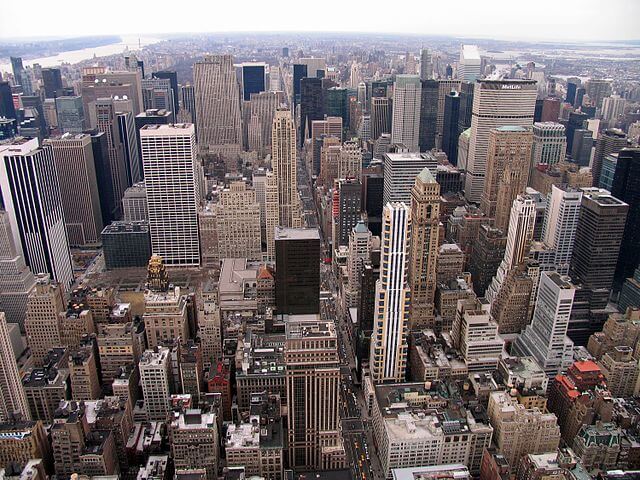No, New York is Not “The Unhappiest City”

Every so often, a new study comes out that seems to confirm New Yorkers’ worst suspicions: This city, scientists conclude, is a terrible place to live. This week, a widely-circulated paper from researchers at the University of British Columbia and Harvard University ranked the top ten “unhappiest” cities. No prizes for guessing which town was at the top of the list. But I don’t buy it, and neither should you.
The tone of the articles that come out after surveys like this one is always the same. It’s that wrinkled-nose reaction of visitors when they come back from fighting the teeming mass of Times Square or Penn Station and say “It’s a nice place to visit, but I could never live here.” It’s as if they are mounting an ongoing campaign to explain to Oscar the Grouch that he lives in a garbage can when there are perfectly good non-rat-infested options out there. Or else, they have that wistful, “Goodbye to All That” tone, in which living in New York City inevitably triggers inexplicable nervous breakdowns but also conjures inchoate longings for adorable bistros in the West Village. (Luv u, Joanie D)
It’s not that the researchers’ methodology isn’t thorough, or that the conclusions drawn from the data they used are necessarily faulty. It’s this simple fact: Happiness is impossible to quantify.
The data used for the “unhappiest city” survey was drawn from the Centers for Disease Control and Prevention’s Behavioral Risk Factor Surveillance System. This numbers are compiled from telephone surveys of participants, in which the survey taker was asked to rank his overall life satisfaction, from “very satisfied” to “very dissatisfied.”
I don’t know about you, but when a stranger calls me on the phone to ask about my mental wellbeing, it is not one of the highlights of my day. Asking people about their overall life happiness is an endeavor that necessarily yields spotty results. (It also has that quality of some distant relative gazing knowingly at you over the Thanksgiving dinner table nodding along and cutting in, “But are you happy?”) It is not as accurate a self-reported statistic as, say, how many children you have or how old you are. Not only does it depend on the mood you’re in when you’re answering the question, it’s also influenced by your personality. Casual pessimism, or even pragmatism, is too often tarred as dissatisfaction with your life. I may report to a friend that “everything is terrible” when my cat vomits on my favorite shoes, but it doesn’t actually mean that I believe my life is a fetid hellhole and I should get rid of the cat immediately and move to a country free of all cats. It means, “Man am I inconvenienced right now” and “reminder that all cats are jerks.” There’s something essential lost in translation in self-reported happiness surveys, just by the nature of the way we communicate about happiness.
And then there’s this telling nugget: “Individuals have other objectives, which we refer to as achievements, such as raising a family.” Yeah, that. Weighing the value of happiness against other life goals is an important point here. Having kids may not make you jubilantly happy all the time, but that doesn’t make it something that isn’t worth doing. Or maybe you have to work a job that’s less than ideal to get to a place in your career you want to be at. Many people come to New York or stay here because this is where the action is for their field, where ambition can pay off. The flipside of ambition is some degree of unhappiness. Dissatisfaction is what makes us change our circumstances, keeps us moving. To some degree, it’s an integral and necessary part of the human condition.
It’s also telling that the researchers ranked the unhappiest cities, not just the unhappiest places or unhappiest rural areas. “Newer residents of these cities appear to be as unhappy as longer term residents, and yet some people continue to move to these areas,” the abstract reads. Well, yeah, of course people move to cities. That’s where things like jobs are, where you’re likelier to find a community of people with similar interests or ideas, just numbers-wise. (Where else can you find a restaurant entirely devoted to rice pudding? C’mon.) This panic about what higher-density living is doing to our brains and feelings is as old as the industrial age, when the first wave of urbanization took root.
Plus, New Yorkers are experts in the art of complaining. This isn’t because New Yorkers are inherently negative, unsatisfied, horrible people, it’s just a form of solidarity in a city that, yes, can be tough to live in. If Southern California has a culture of sunny optimism, New York has one of good-natured kvetching, in which you trade horrible landlord stories or stalled subway nightmares or slow-walking tourists or the million other weirdnesses you are bound to encounter living here. But these stories are a form of currency, not a laundry list of reasons that I really should move to Phenix City.
New York City can be difficult place to live, no question. There are high rents and sketchy landlords and expensive groceries and bedbugs and invasions of bros to deal with. The rapid current of the place is hard to contend with and adapt to, and it is not for everyone. It can be ruthless, particularly if you don’t happen to have a couple million dollars lying around.
But it is also a city full of insane wonders. For every two parts trash water, there is equal part free champagne. There are treasures everywhere that are madly accessible, and a sense of serendipity that the density of the city affords you. That’s why we live here in the first place, most of us, for a chance to encounter those rare and precious things that exist here in higher density than most anywhere else. Is it the unhappiest city? I doubt it. It depends on who you ask and when.
Follow Margaret Eby on twitter @margareteby
You might also like 



















